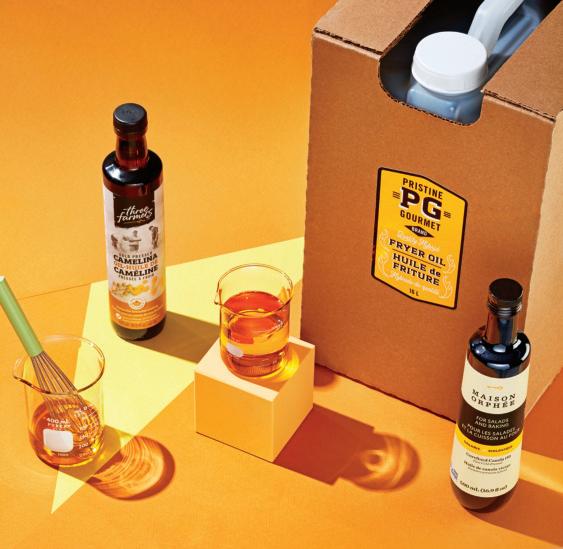
2 minute read
Notes
2
3
Advertisement
3
Hold the heat
COLD-PRESSING is used to extract oil from seeds, nuts and other plants without using heat, which helps preserve both nutrients and taste. Canadian vegetable oils made this way are friendlier to the environment than most heat-expressed supermarket offerings, as they travel a shorter distance to shelves and don’t require the use of chemical solvents in the production process. When choosing an oil, consider the flavour profile you’re looking for and the temperature you’ll be cooking at. We put three oils farmed and produced in Canada to the test—read on for the tasty results.
3. CAMELINA OIL, THREE FARMERS
This oil is extracted from a flowering plant— Camelina sativa, also known as gold-of-pleasure—that’s native to Europe and Asia. It’s also a decent substitute for peanut oils. Three Farmers’ camelina is primarily grown in Saskatchewan and cold-pressed in Saskatoon. Taste test: On its own, camelina oil has a light asparagus flavour, which makes it good for salad dressing. We whisked together crushed garlic, honey mustard and red wine vinegar, then drizzled in the oil. It emulsified smoothly and took on the flavours it was paired with. Two 500-mL bottles, $30, threefarmers.ca.
2. FRYER OIL, PRISTINE GOURMET
Fats used for deep-frying need a high smoke point (once an oil starts to smoke, its nutritional profile is compromised and it can also alter the taste of your food). This blend of refined canola and cold-pressed sunflower oils fits the bill. Taste test: On its own, the oil has a light, nutty flavour. We double- fried Canadian russet potatoes in a generous amount, and the oil retained its golden colour throughout the process. The resulting flavour was quite neutral, and after we salted our fries, they tasted like they came straight from a fry truck! 16-L package, $35, pristinegourmet.com.
3. ORGANIC UNREFINED CANOLA OIL, MAISON ORPHÉE
This Quebec company has been cold-pressing oils for more than 30 years. Made from canola grown in Ontario and the Prairies, this one is pressed at Maison Orphée’s Quebec City factory. Taste test: On its own, coldpressed canola oil has a light, arugula-like flavour that’s slightly earthy and bitter. It mixed well with other wet ingredients when we made a batch of blueberry muffins. There wasn’t any harsh taste in the final product, and leftovers kept well for days without any changes to the taste or texture. 500-mL bottle, $9, maisonorphee.com.
WE’LL DRINK TO THAT Zero proof
Raise a glass with alcohol-free spirits, beer and more
This “alt-spirit” has notes of citrus, cucumber and mint— perfect for gimlets, French 75s and much more. 375-mL bottle, $20, enjoylumette.com.
Distilled using a spicy botanical blend of juniper berries, coriander, allspice and star anise, Sobrii handily stands in for gin. 200-mL bottle, $17, sobrii.ca.
Known as “wine proxies,” these blends—made from juice, tea, spices and bitters—boast similar flavour complexities to your favourite vinos.
Three 750-mL bottles, $70, acidleague.com.
Light, citrusy and hoppy, this craft-brewed pale ale from Prince Edward Island goes down easy when ice-cold. 12-pack of cans, $30, drinklibra.ca.
Spirit Tree’s orchard in Caledon,
Ont., doubles as a cidery and makes a great sparkling wine alternative. 750-mL bottle, $9, spirittreecider.com.









